- Home
- Michael Cunningham
Specimen Days Page 3
Specimen Days Read online
Page 3
He lifted another plate from the bin, lined it up, fastened the clamps, and sent it under the teeth of the wheel.
Where was Jack? Didn’t he want to know how well Lucas was doing his work? Lucas said, as the plate went under the wheel, “Urge and urge and urge, always the procreant urge of the world.”
Jack didn’t come to him until the workday’s end. Jack looked at Lucas, looked at the machine, nodded, and looked at Lucas again.
“You’ve done all right,” he said.
“Thank you, sir.”
“You’ll be back tomorrow, then.”
“Yes, sir. Thank you, sir.”
Lucas extended his hand to Jack and was surprised to see that it shook. He had known his fingers were bleeding; he hadn’t known about the shaking. Still, Jack took his hand. He didn’t appear to mind about the shaking or the blood.
“Prodigal,” Lucas said, “you have given me love—therefore I to you give love!”
Jack paused. His iron face took on three creases across the expanse of its forehead.
“What was that?”
“Good night,” Lucas said.
“Good night,” Jack replied doubtfully.
Lucas hurried away, passed with the others through the cooking room, where the men with the black poles were shutting down their furnaces. He found that he could not quite remember having been anywhere but the works. Or rather, he remembered his life before coming to the works as a dream, watery and insubstantial. It faded as dreams fade on waking. None of it was as actual as this. None of it was so true. Align, clamp, pull, pull again, inspect.
A woman in a light blue dress waited outside the entrance to the works. Lucas took a moment in recognizing her. He saw first that a woman stood at the entrance and thought that the works had summoned an angel to bid the men goodbye, to remind them that work would end someday and a longer dream begin. Then he understood. Catherine had come. She was waiting for him.
He recognized her a moment before she recognized him. He looked at her face and saw that she had forgotten him, too.
He called out, “Catherine.”
“Lucas?” she said.
He ran to her. She inhabited a sphere of scented and cleansed air. He was gladdened. He was furious. How could she come here? Why would she embarrass him so?
She said, “Look at you. You’re all grime. I didn’t know you at first.”
“It’s me,” he said.
“You’re shaking all over.”
“I’m all right. I’m well.”
“I thought you shouldn’t walk home alone. Not after your first day.”
He said, “This isn’t a fit place for a woman on her own.”
“Poor boy, just look at you.”
He bristled. He had set the wheel turning. He had inspected every plate.
“I’m fine,” he said, more forcefully than he’d meant to.
“Well, let’s take you home. You must be starving.”
They walked up Rivington Street together. She did not put her hand on his elbow. He was too dirty for that. A fitful breeze blew in from the East River and along the street, stirring up miniature dust storms with scraps of paper caught in them. The dark facades of brick houses rose on either side, the lid of the sky clamped down tightly overhead. The sidewalk was crowded, all the more so because those who walked there shared the pavement with heaps of refuse that lay in drifts against the sides of the buildings, darkly massed, wet and shiny in their recesses.
Lucas and Catherine walked with difficulty on the narrow paved trail between the housefronts and the piles of trash. They fell in behind a woman and a child who moved with agonizing slowness. The woman—was she old or young? It was impossible to tell from behind—favored her left leg, and the child, a girl in a long, ragged skirt, seemed not to walk at all but to be conveyed along by her mother’s hand as if she were a piece of furniture that must be dragged home. Ahead of the woman and child walked a large bald man in what appeared to be a woman’s coat, worn shiny in spots, far too small for him, the sleeves ripped at the shoulders, showing gashes of pink satin lining. Lucas could not help imagining this procession of walkers, all of them poor and battered, wearing old coats too small or too large for them, dragging children who could not or would not walk, all marching along Rivington Street, impelled by someone or something that pushed them steadily forward, slowly but inexorably, so it only seemed as if they moved of their own will; all of them walking on, past the houses and stables, past the taverns, past the works and into the river, where they would fall, one after another after another, and continue to walk, drowned but animate, on the bottom, until the street was finally empty and the people were all in the river, trudging along its silty bed, through its drifts of brown and sulfur, into its deeper darks, until they reached the ocean, this multitude of walkers, until they were nudged into open water where silver fish swam silently past, where the ocher of the river gave over to inky blue, where clouds floated on the surface, far, far above, and they were free, all of them, to drift away, their coats billowing like wings, their children flying effortlessly, a whole nation of the dead, dispersing, buoyant, faintly illuminated, spreading out like constellations into the blue immensity.
He and Catherine reached the Bowery, where the rowdies strutted together, brightly clad, past the taverns and oyster houses. They swaggered and shouted, chewing cigars fat as sausages. One tipped his stovepipe to Catherine, began to speak, but was pulled onward by his laughing companions. The Bowery was Broadway’s lesser twin, a minor star in the constellation, though no less bright and loud. Still, there was more room to walk here. The truly poor were more numerous.
Catherine said, “Was it dreadful there?”
Lucas answered, “The machinist rolls up his sleeves, the policeman travels his beat, the gate-keeper marks who pass.”
“Please, Lucas,” she said, “speak to me in plain English.”
“The foreman said I did well,” he told her.
“Will you promise me something?”
“Yes.”
“Promise that as long as you must work there you will be very, very careful.”
Lucas thought guiltily of the clamp. He had not been careful. He had allowed himself to dream and drift.
He said, “I know I am deathless, I know this orbit of mine cannot be swept by a carpenter’s compass.”
“And promise me that as soon as you can, you will leave that place and find other work.”
“I will.”
“You are…”
He waited. What would she tell him he was?
She said, “You are meant for other things.”
He was happy to hear it, happy enough. And yet he’d hoped for more. He’d wanted her to reveal something, though he couldn’t say what. He’d wanted a wonderful lie that would become true the moment she said it.
He said, “I promise.” What exactly was he meant for? He couldn’t bring himself to ask.
“It’s hard,” she said.
“And you? Were you all right at work today?”
“I was. I sewed and sewed. It was a relief, really, to work.”
“Were you…”
She waited. What did he mean to ask her?
He asked, “Were you careful?”
She laughed. His face burned. Had it been a ridiculous question? She seemed always so available to harm, as if someone as kind as she, as sweet-smelling, could only be hurt, either now or later.
“I was,” she said. “Do you worry about me?”
“Yes,” he said. He hoped it was not a foolish assertion. He waited nervously to see if she’d laugh again.
“You mustn’t,” she said. “You must think only of yourself. Promise me.”
He said, “Every atom belonging to me as good belongs to you.”
“Thank you, my dear,” she answered, and she said no more.
He took her to her door, on Fifth Street. They stood together on the stoop that was specked with brightness.
“You will go home n
ow,” she said, “and have your supper.”
“May I ask you something?” he said.
“Ask me anything.”
“I wonder what it is I’m making at the works.”
“Well, the works produces many things, I think.”
“What things?”
“Parts of larger things. Gears and bolts and…other parts.”
“They told me I make housings.”
“There you are, then. That’s what you make.”
“I see,” he said. He didn’t see, but it seemed better to let the subject pass. It seemed better to be someone who knew what a housing was.
Catherine looked at him tenderly. Would she kiss him again?
She said, “I want to give you something.”
He trembled. He kept his jaws clamped shut. He would not speak, not as the book or as himself.
She unfastened the collar of her dress and reached inside. She drew out the locket. She pulled its chain up over her head, held locket and chain in her palm.
She said, “I want you to wear this.”
“I can’t,” he said.
“It has a lock of your brother’s hair inside.”
“I know. I know that.”
“Do you know,” she said, “that Simon wore its twin, with my picture inside?”
“Yes.”
“I was not allowed to see him,” she said.
“None of us was.”
“But the undertaker told me the locket was with him still. He said Simon wore it in his casket.”
Simon had Catherine with him, then. He had something of Catherine in the box across the river. Did that make her an honorary member of the dead?
Catherine said, “I’ll feel better if you wear it when you go to the works.”
“It’s yours,” he said.
“Call it ours. Yours and mine. Will you do it, to please me?”
He couldn’t protest, then. How could he refuse to do anything that would please her?
He said, “If you like.”
She put the chain over his head. The locket hung on his chest, a little golden orb. She had worn it next to her skin.
“Good night,” she said. “Have your supper and go straight to bed.”
“Good night.”
She kissed him then, not on his lips but on his cheek. She turned away, put her key in the lock. He felt the kiss still on his skin after she’d withdrawn.
“Good night,” he said. “Good night, good night.”
“Go,” she commanded him. “Do what you must for your mother and father, and rest.”
He said, “I ascend from the moon…I ascend from the night.”
She glanced at him from her doorway. She had been someone who laughed easily, who was always the first to dance. She looked at him now with such sorrow. Had he disappointed her? Had he deepened her sadness? He stood helplessly, pinned by her gaze. She turned and went inside.
At home, he fixed what supper he could for himself and his father. There were bits, still, from what had been brought for after the burial. A scrap of fatty ham, a jelly, the last of the bread. He laid it before his father, who blinked, said, “Thank you,” and ate. Between mouthfuls, he breathed from the machine.
Lucas’s mother was still in bed. How would they manage about food if she didn’t rise soon?
As his father ate and breathed, Lucas went to his parents’ bedroom. Softly, uncertainly, he pushed open the door. The bedroom was dark, full of its varnish and wool. Over the bed the crucifix hung, black in the sable air.
He said, “Mother?”
He heard the bedclothes stirring. He heard the whisper of her breath.
She said, “Who’s there?”
“It’s only me,” he answered. “Only Lucas.”
“Lucas. M’love.”
His heart shivered. It seemed for a moment that he could abide with his mother in the sweet, warm darkness. He could stay here with her and tell her the book.
“Did I wake you?” he asked.
“I’m ever awake. Come.”
He sat on the edge of the mattress. He could see the sprawl of her hair on the pillow. He could see her nose and chin, the dark places where her eyes were. He touched her face. It was hot and powdery, dry as chalk.
“Are you thirsty, are you hungry?” he asked. “Can I bring you something?”
She said, “What’s happened to ye? How have they darkened ye so?”
“I’ve been to work, Mother. It’s only dust.”
“Where’s Lucas, then?”
“I’m here, Mother.”
“Of course you are. I’m not quite right, am I?”
“Let me bring you some water.”
“The hens need looking after. Have ye seen to the hens?”
“The hens, Mother?”
“Yes, child. It’s gone late, hasn’t it? I think it’s very late indeed.”
“We haven’t any hens.”
“We haven’t?”
“No.”
“Forgive me. We did have hens.”
“Don’t worry, Mother.”
“Oh, it’s fine to say don’t worry, with the hens gone and the potatoes, too.”
Lucas stroked her hair. He said, “Divine am I inside and out, and I make holy whatever I touch or am touch’d from.”
“That’s right, m’dear.”
Lucas sat quietly with her, stroking her hair. She had been nervous and quick, prone to argument, easily angered and slow to laugh. (Only Simon could make her laugh.) She’d been vanishing gradually for a year or longer, always more eager to be done with her work and off to bed, but still herself, still dutiful and fitfully affectionate, still alert to slights and hidden insults. Now that Simon was dead she’d turned into this, a face on a pillow, asking after hens.
He said, “Should I bring you the music box?”
“That’d be nice.”
He went to the parlor and returned with the box. He held it up for her to see.
“Ah, yes,” she said. Did she know that the box had ruined them? She never spoke of it. She seemed to love the music box as dearly as she would have if it had caused no damage at all.
Lucas turned the crank. Within the confines of the box, the brass spool revolved under the tiny hammers. It played “Forget Not the Field” in its little way, bright metallic notes that spangled in the close air of the bedroom. Lucas sang along with the tune.
Forget not the field where they perish’d,
The truest, the last of the brave,
All gone—and the bright hope we cherish’d
Gone with them, and quench’d in their grave.
His mother put a hand over his. “That’s enough,” she said.
“It’s only the first verse.”
“It’s enough, Lucas. Take it away.”
He did as she asked. He returned the music box to its place on the parlor table, where it continued playing “Forget Not the Field.” Once wound, it would not stop except by its own accord.
His father had moved from his place at the table to his chair by the window. He nodded gravely, as if agreeing with something the music said.
“Do you like the music?” Lucas asked him.
“Can’t be stopped,” his father said in his new voice, which was all but indistinguishable from his breathing, as if his machine’s bellows were whispering language as they blew.
“It’ll stop soon.”
“That’s good.”
Lucas said, “Good night, Father,” because he could not think of anything else to say.
His father nodded. Could he get himself to bed? Lucas thought he could. He hoped so.
He went to his own room, his and Simon’s. Emily’s window was lit. She was faithfully eating her candy, just as Lucas faithfully read his book.
He undressed. He did not remove the locket. If he removed the locket, if he ever removed the locket, it would no longer be something Catherine had put on him. It would become something he put upon himself.
Carefully, he f
ound the locket’s catch and opened it. Here was the black curl of Simon’s hair, tied with a piece of purple thread. Here, under the curl, was Simon’s face, obscured by the hair. Lucas knew the picture: Simon two years ago, frowning for the photographer, his eyes narrow and his jaw set. Simon’s face in the locket was pale brown, like turned cream. His eyes (one was partially visible through the strands of hair) were black. It was like seeing Simon in his casket, which no one had been allowed to do. What the machine had done had rendered him too extraordinary. Now, in the quiet of the room, the Simon who was with them still met the Simon who was in the locket, and here he was, doubled; here was the smell and heft of him; here his habit, on the drinking nights, of slapping Lucas playfully. Lucas closed the locket. It made a small metallic snap.
He got into bed, on his own side. He read the evening’s passage.
I guess the grass is itself a child, the produced babe of the vegetation,
Or I guess it is a uniform hieroglyphic,
And it means, Sprouting alike in broad zones and narrow zones,
Growing among black folks as among white,
Kanuck, Tuckahoe, Congressman, Cuff, I give them the same, I receive them the same.
When he had finished it he put out the lamp. He could feel Simon in the locket and Simon in the box in the earth, so changed that the lid had been nailed shut. Lucas determined never to open the locket again. He would wear it always but keep it forever sealed.
He slept, and woke again. He rose to dress for work and get breakfast for his father, feeling the locket’s unfamiliar weight on his neck, the circle of it bouncing gently on his breastbone. Here was the memento of Simon’s ongoing death for him to wear close to his heart, because Catherine had put it on him.

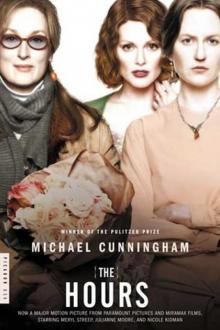 The Hours
The Hours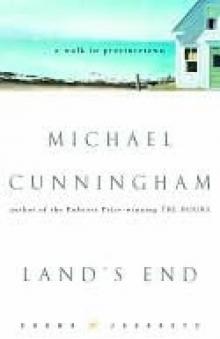 Land's End: A Walk in Provincetown
Land's End: A Walk in Provincetown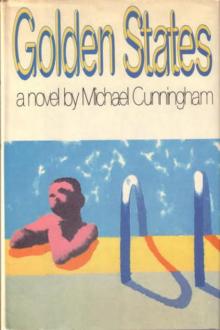 Golden States
Golden States A Wild Swan
A Wild Swan A Home at the End of the World
A Home at the End of the World Flesh and Blood
Flesh and Blood Specimen Days
Specimen Days Land's End
Land's End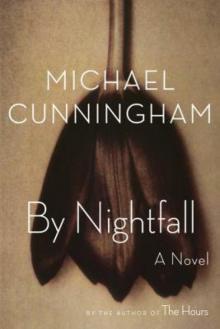 By Nightfall
By Nightfall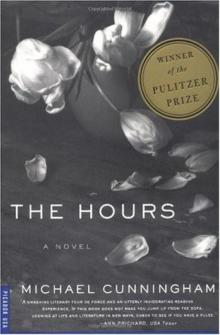 Hours
Hours